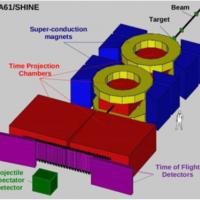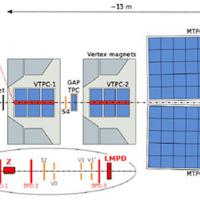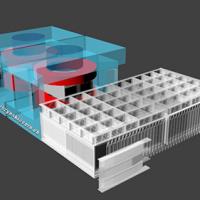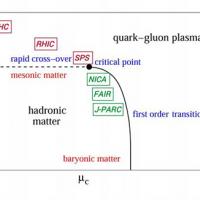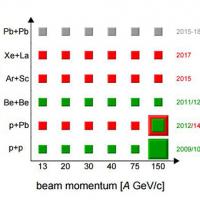A proposal to accept MEPhI in an international collaboration NA61/SHINE (SPS Heavy Ion and Neutrino Experiment) has been unanimously approved at the meeting of a Steering Committee of the collaboration, held in Paris on 27 May 2015.
History of the international collaboration NA61/SHINE (http://shine.web.cern.ch) has started in 2003 with an idea of a new programme of experiments to search for a critical point of strongly interacting nuclear matter resulting from relativistic nucleus-nucleus collisions, as well as to carry out detailed studies of deconfinement. For these purposes they chose a SPS (Super Proton Synchrotron), which is an injector for LHC at CERN. The program constituted a simultaneous scanning of collision energy for three different types of colliding particles.
· Nucleus-nucleus collisions for a detailed study of deconfinement beginning;
· Proton-proton and proton-nucleus collisions for better understanding of nature of matter formed in nucleus-nucleus collisions;
· Hadron-nuclear collisions necessary for successful experiments with neutrino beams at J-PARC (Japan) and Fermilab (USA). Results of these measurements are essential for understanding of results of experiments with cosmic rays, held in the world's largest Pierre Auger Observatory.
The first experiments of collaboration NA61/SHINE was launched in 2006 and now a half of the way to the goal has passed. Today, the collaboration consists of 135 scientists from 35 institutions and universities from 14 countries.
The program of scientists from MEPhI includes a detailed study of a azimuthal flow of hadrons produced in nucleus-nucleus and proton-nucleus collisions. Also, MEPhI scientists plan to make a significant contribution to the modernization of a forward hadron calorimeter (PSD) of the experiment, which was built by a group of F.Guber from the Institute of Nuclear Physics of Russian Academy of Sciences (Troitsk, Russia) and used to determine centrality and plane of a reaction in nucleus-nucleus collisions. Uniqueness of this detector, weighing more than 100 tons and having a longitudinal segmentation, has already been noted by other collaborations. Similar detectors have been ordered for future experiments by CBM (FAIR, GSI) and MPD (NICA, Dubna).
The collaboration NA61/SHINE is interested in MEPhI undergraduate and postgraduate students to participate in the experiment and process experimental data. In the framework of preparation of a research work in this scientific field, students of 1-3 years of study of the Faculty “Experimental and theoretical physics” will listen to the following elective courses in September 2015:
1) Programming in C++,
2) Basis of experimental data processing using the ROOT package,
3) Fundamentals of relativistic nuclear physics,
4) Preparation of scientific presentations.
Then students will be sent on a trip to CERN for a period of 2-4 months to master all software packages and participate in the work of the international collaboration NA61/SHINE.






